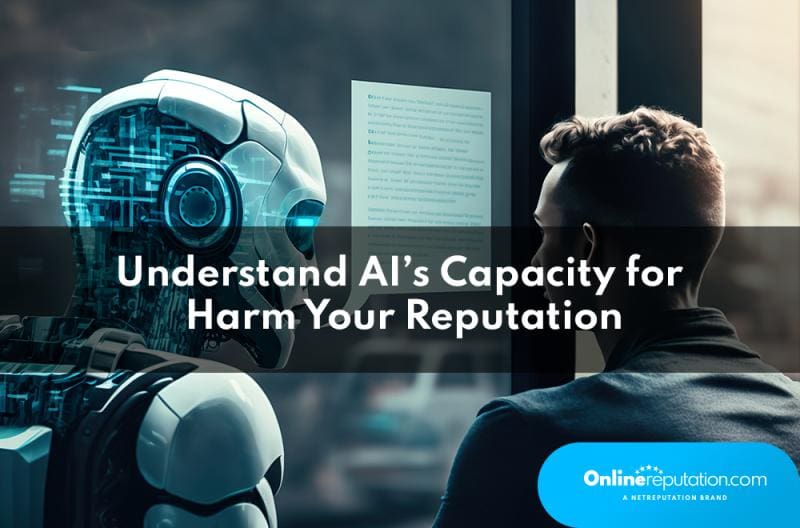
Artificial intelligence (AI) has brought about remarkable advancements, but it also poses certain risks to one’s online image. In this article, we will explore how AI can potentially harm your reputation and dive into effective measures to safeguard it.
The Dark Side of AI
Everyone is talking about the positives, but you cannot ignore these negatives as well. While artificial intelligence (AI) has undeniably revolutionized various facets of our lives, its dark side poses a formidable challenge. Understanding AI’s nuanced threats is essential for individuals and businesses seeking to fortify their digital presence. Let’s delve deeper into the ominous aspects of AI that can cast a shadow over your online standing.
Deep-Fakes and Manipulated Content
At the forefront of AI’s dark side is the emergence of deepfake technology. This sophisticated application of AI allows malevolent actors to create hyper-realistic forged content, including videos, audio recordings, and images. Imagine the potential harm of a manipulated video circulating on social media. And portraying individuals engaging in activities they never participated in. Deepfakes not only erode trust but also have the power to damage reputations irreparably.
In 2019, a deepfake video featuring Facebook CEO Mark Zuckerberg went viral on Instagram. The fabricated video showed Zuckerberg boasting about his control over people’s data. While raising awareness about deepfake technology was a stunt, it highlighted the potential for malicious actors. And create convincing false narratives that could tarnish the reputation of public figures or businesses.
Automated Social Media Attacks
The rise of automated bots fueled by AI algorithms brings a new wave of social media attacks. These bots can be programmed to spread misinformation, engage in smear campaigns, or even impersonate real individuals. With the capacity to mimic human interactions convincingly, they can tarnish reputations by manipulating public opinion and fostering an environment of distrust.
X (formerly known as Twitter) has been a battleground for automated social media attacks. Bots, powered by AI algorithms, have been used to spread false information, amplify divisive narratives, and impersonate real users. The 2020 U.S. Presidential elections saw a surge in automated accounts disseminating misinformation, influencing public opinion, and contributing to a toxic online environment that can harm reputations.
Algorithmic Bias and Discrimination
Despite the promises of objectivity, AI systems are not immune to bias. In the context of online reputation, biased algorithms can perpetuate discriminatory practices, leading to unfair treatment of individuals or communities. Whether through search engine results or targeted advertising, algorithmic biases can amplify existing stereotypes and prejudices, negatively impacting the perceived reputation of those affected.
Google’s search algorithms have been scrutinized for exhibiting biases. In 2018, it was revealed that the image recognition feature of Google Photos showed racial bias by mislabeling photos of individuals, predominantly people of color. Such biases in algorithms can affect search results, potentially leading to unfair profiling and damaging the online reputation of political figures, celebrities, and even common people or communities.
Privacy Invasion and Data Exploitation
The proliferation of AI-driven data analytics has raised concerns regarding privacy invasion and data exploitation. Unscrupulous actors can leverage AI algorithms to mine vast amounts of personal data, leading to the exposure of sensitive information. Misusing such data jeopardizes individual privacy and opens the door to reputational harm as personal details are weaponized against individuals or organizations.
The Cambridge Analytica scandal in 2018 highlighted the misuse of personal data for political purposes. Advanced data analytics, including AI applications, were employed to harvest and exploit the personal information of millions of Facebook users without their consent. This incident breached privacy and triggered a severe backlash against Facebook, impacting its reputation and user trust.
Social Engineering and Phishing Attacks:
AI can enhance the sophistication of social engineering and phishing attacks. By analyzing vast datasets, AI algorithms can craft targeted and convincing messages, making it increasingly challenging for individuals to discern genuine communication from malicious intent. Falling victim to such attacks can severely affect one’s online reputation, as exploiting personal information erodes trust.
Understanding the dark side of AI is the first step in devising effective strategies to protect your online reputation. As technology advances, so must our defenses against these malicious applications. In the subsequent sections, we will explore proactive measures and counter-strategies to mitigate the risks posed by the malevolent application of artificial intelligence.
AI-powered phishing attacks have become more sophisticated. Cybercriminals can use AI algorithms to analyze publicly available data and craft highly personalized phishing emails. In 2020, a business email compromise attack targeted a European energy company, where AI was used to mimic the CEO’s writing style, leading to the fraudulent transfer of funds. Such attacks pose financial risks and damage the targeted individual’s or organization’s reputation for cybersecurity vigilance.
Protective Measures Against AI-Induced Reputation Risks:

Internet, where authenticity reigns supreme, safeguarding against the potential risks posed by artificial intelligence (AI) is a mission we undertake at onlinereputation.com with a commitment to practicality. In this segment, we unravel tangible measures that individuals and businesses can employ, integrating our expertise to shield their digital image from the nuanced threats introduced by AI. Dispensing with buzzwords, we focus on real-world strategies, from vigilant monitoring to harnessing the positive facets of AI, providing a robust defense against evolving technological challenges.
Regular Monitoring and Alerts
At onlinereputation.com, we advocate for a vigilant approach to reputation management. Our tailored online monitoring tools reduce the noise, offering substance over hype. We empower our clients to stay ahead of potential threats through precise tracking and timely alerts, ensuring a proactive response to safeguard their online standing.
Deepfake Detection Software
Acknowledging the sophistication of AI-generated content, onlinereputation.com recommends integrating cutting-edge deepfake detection software. Our expertise lies in leveraging advanced algorithms that discern between authentic and manipulated content. By incorporating these practical solutions, our clients can trust that their online presence remains untarnished by misleading and damaging deepfakes.
Enhance Cybersecurity Measures
Cybersecurity is a cornerstone of reputation management, and at onlinereputation.com, we emphasize practical steps to fortify defenses. From implementing multi-factor authentication to maintaining robust passwords, our approach transcends buzzwords, focusing on fundamental measures to minimize vulnerabilities against AI-driven attacks.
Transparency in AI Usage
Transparency is a core tenet of our philosophy at onlinereputation.com. When it comes to AI utilization, we advocate for clear communication. Stripping away unnecessary embellishments, our approach aligns with building genuine connections. Through transparent communication, we address concerns about potential biases or misuse of AI, fostering trust in our clients’ online interactions.
Educate Your Audience
Practicality takes precedence in our strategy at onlinereputation.com. We actively encourage our clients to proactively educate their audience on the challenges posed by AI manipulation. By transparently communicating the concrete steps being taken, we build trust and empower audiences to discern credible information from potential manipulation.
Leverage Positive AI Applications
Embracing the positive facets of AI is a hallmark of our approach at onlinereputation.com. We guide clients in implementing AI to enhance user experience, improve services, and showcase a commitment to innovation. This grounded approach aligns with authenticity and serves as a counterbalance to potential negative perceptions surrounding AI.
In conclusion, onlinereputation.com stands as a beacon of practicality in reputation management. By integrating our expertise into these measures, individuals and businesses can fortify their digital presence against the evolving threats introduced by artificial intelligence, ensuring a resilient and authentic online reputation.
You might also like
Building Online Reputation Through Influencer Collaborations
Artificial intelligence (AI) has brought about remarkable advancements, but it also poses certain risks to one’s online image. In this …
